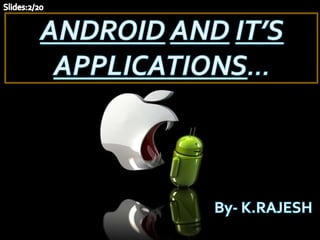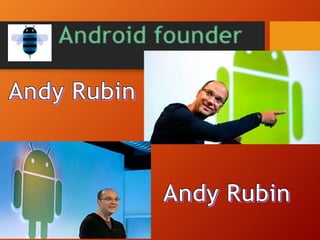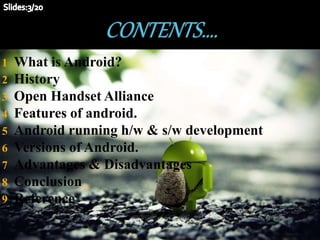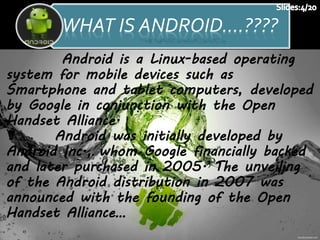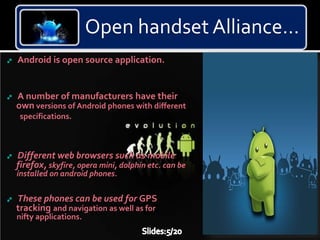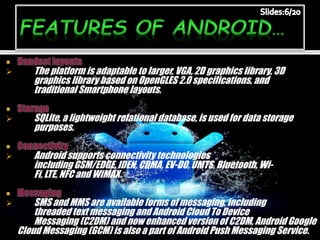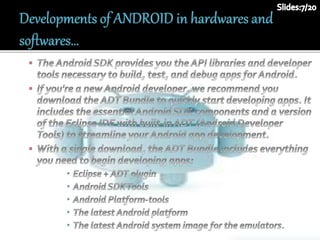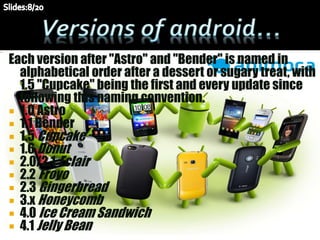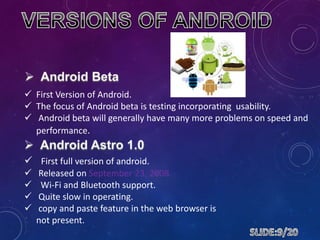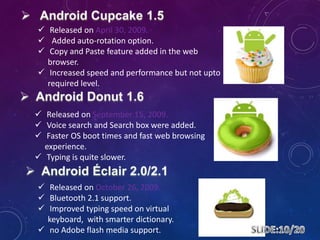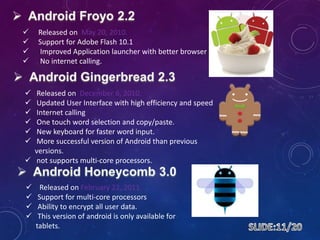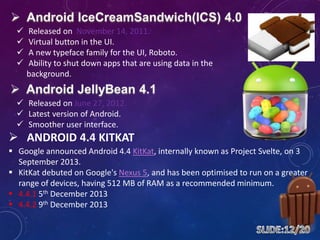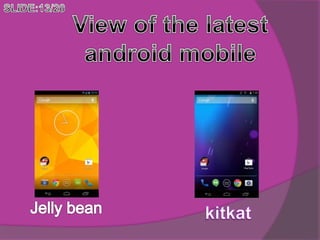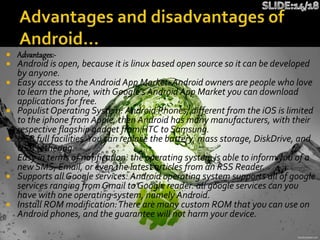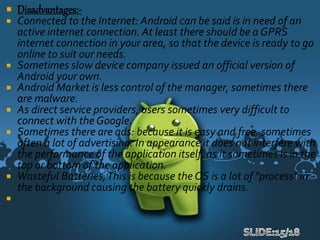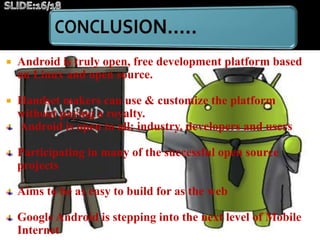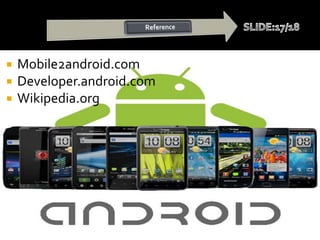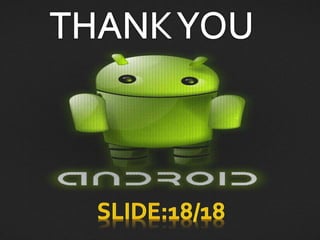andriodrajesh
- 4. 1 What is Android? 2 History 3 Open Handset Alliance 4 Features of android. 5 Android running h/w & s/w development 6 Versions of Android. 7 Advantages & Disadvantages 8 Conclusion 9 Reference
- 5. Android is a Linux-based operating system for mobile devices such as Smartphone and tablet computers, developed by Google in conjunction with the Open Handset Alliance. Android was initially developed by Android Inc., whom Google financially backed and later purchased in 2005. The unveiling of the Android distribution in 2007 was announced with the founding of the Open Handset Alliance¡ WHAT IS ANDROID¡.????
- 6. Android is open source application. A number of manufacturers have their own versions of Android phones with different specifications. Different web browsers such as mobile firefox, skyfire, opera mini, dolphin etc. can be installed on android phones. These phones can be used for GPS tracking and navigation as well as for nifty applications. Open handset Alliance¡
- 7. ? The platform is adaptable to larger, VGA, 2D graphics library, 3D graphics library based on OpenGLES 2.0 specifications, and traditional Smartphone layouts. ? SQLite, a lightweight relational database, is used for data storage purposes. ? Android supports connectivity technologies including GSM/EDGE, IDEN, CDMA, EV-DO, UMTS, Bluetooth, Wi- Fi, LTE, NFC and WiMAX. ? SMS and MMS are available forms of messaging, including threaded text messaging and Android Cloud To Device Messaging (C2DM) and now enhanced version of C2DM, Android Google Cloud Messaging (GCM) is also a part of Android Push Messaging Service.
- 9. Each version after "Astro" and "Bender" is named in alphabetical order after a dessert or sugary treat, with 1.5 "Cupcake" being the first and every update since following this naming convention. ? 1.0 Astro ? 1.1 Bender ? 1.5 Cupcake ? 1.6 Donut ? 2.0/2.1 Eclair ? 2.2 Froyo ? 2.3 Gingerbread ? 3.x Honeycomb ? 4.0 Ice Cream Sandwich ? 4.1 Jelly Bean
- 10. ? First Version of Android. ? The focus of Android beta is testing incorporating usability. ? Android beta will generally have many more problems on speed and performance. ? First full version of android. ? Released on September 23, 2008. ? Wi-Fi and Bluetooth support. ? Quite slow in operating. ? copy and paste feature in the web browser is not present.
- 11. ? Released on April 30, 2009. ? Added auto-rotation option. ? Copy and Paste feature added in the web browser. ? Increased speed and performance but not upto required level. ? Released on September 15, 2009. ? Voice search and Search box were added. ? Faster OS boot times and fast web browsing experience. ? Typing is quite slower. ? Released on October 26, 2009. ? Bluetooth 2.1 support. ? Improved typing speed on virtual keyboard, with smarter dictionary. ? no Adobe flash media support.
- 12. ? Released on May 20, 2010. ? Support for Adobe Flash 10.1 ? Improved Application launcher with better browser ? No internet calling. ? Released on December 6, 2010. ? Updated User Interface with high efficiency and speed ? Internet calling ? One touch word selection and copy/paste. ? New keyboard for faster word input. ? More successful version of Android than previous versions. ? not supports multi-core processors. ? Released on February 22, 2011. ? Support for multi-core processors ? Ability to encrypt all user data. ? This version of android is only available for tablets.
- 13. ? Released on November 14, 2011. ? Virtual button in the UI. ? A new typeface family for the UI, Roboto. ? Ability to shut down apps that are using data in the background. ? Released on June 27, 2012. ? Latest version of Android. ? Smoother user interface. ? ANDROID 4.4 KITKAT ? Google announced Android 4.4 KitKat, internally known as Project Svelte, on 3 September 2013. ? KitKat debuted on Google's Nexus 5, and has been optimised to run on a greater range of devices, having 512 MB of RAM as a recommended minimum. ? 4.4.1 5th December 2013 ? 4.4.2 9th December 2013
- 15. ? Advantages:- ? Android is open, because it is linux based open source so it can be developed by anyone. ? Easy access to the Android App Market: Android owners are people who love to learn the phone, with Google's Android App Market you can download applications for free. ? Populist Operating System: Android Phones, different from the iOS is limited to the iphone from Apple, then Android has many manufacturers, with their respective flagship gadget from HTC to Samsung. ? USB full facilities.You can replace the battery, mass storage, DiskDrive, and USB tethering. ? Easy in terms of notification: the operating system is able to inform you of a new SMS, Email, or even the latest articles from an RSS Reader. ? Supports all Google services: Android operating system supports all of google services ranging from Gmail to Google reader. all google services can you have with one operating system, namely Android. ? Install ROM modification:There are many custom ROM that you can use on Android phones, and the guarantee will not harm your device.
- 16. ? Disadvantages:- ? Connected to the Internet: Android can be said is in need of an active internet connection. At least there should be a GPRS internet connection in your area, so that the device is ready to go online to suit our needs. ? Sometimes slow device company issued an official version of Android your own. ? Android Market is less control of the manager, sometimes there are malware. ? As direct service providers, users sometimes very difficult to connect with the Google. ? Sometimes there are ads: because it is easy and free, sometimes often a lot of advertising. In appearance it does not interfere with the performance of the application itself, as it sometimes is in the top or bottom of the application. ? Wasteful Batteries,This is because the OS is a lot of "process" in the background causing the battery quickly drains. ?
- 17. ? Android is truly open, free development platform based on Linux and open source. ? Handset makers can use & customize the platform without paying a royalty. Android is open to all: industry, developers and users Participating in many of the successful open source projects Aims to be as easy to build for as the web Google Android is stepping into the next level of Mobile Internet
- 18. ? Mobile2android.com ? Developer.android.com ? Wikipedia.org


